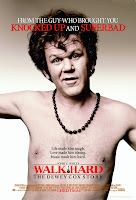 Juno (Jason Reitman, 2007)Rating:
Juno (Jason Reitman, 2007)Rating: 4.8
Juno is coincidentally enough, about Juno MacGuff (Ellen Page), an offbeat yet intelligent sixteen year old girl who is faced with an unplanned pregnancy after having sex with her best friend Paulie Bleeker(Michael Cera). Writer, Diablo Cody tackles a controversial subject, without offering much to say about teenage pregnancy, adoption, or abortion. Instead Cody focuses on the hip and witty dialogue, that seems more forced and phony than anything (who talks like this?). I actually can only recall genuinely laughing at one line in reference to adoption: "You should go to China, they're giving them [babies] away like free Ipods. They shoot them out of t-shirt guns at stadiums." Cera fortunately provides comedy through his ability to transform an innocuous line of dialogue into an awkward moment of hilarity. Cody really doesn't concentrate on the two major characters themselves as much as she should either. All we really know or learn about Bleaker is that he is an awkward teenage guy who is part of the cross country team and was formerly in a band with Juno. Although Juno gets most of the screen time, she is pretty one, perhaps two dimensional herself.
After the screening there was a Q&A with director Jason Reitman and writer "Diablo Cody" if that is her real name? (It isn't). Cody continued to lose credibility with me when confronted about her past working as a stripper. Not that I have anything against that, but her reasoning was complete bullshit. She said that she was "bored and since she grew up in a conventional small town environment, needed to add excitement for writing inspiration." She was apparently discovered through the world of blogging. She also mentioned that she "hates the word "bog" due to the trendy association of it by nature, although her entire script contained an abundance of such hip and snarky word usage. I was especially annoyed by Cera's multiple uses of the word "wizard." It's obvious that Juno, is a semi autobiographical adolescent representation of the author herself, although I'm sure Cody wasn't half as "cool" as she is portrayed. An audience member brought up a good plot-hole point during the Q&A. "Juno is conveyed as intelligent and very with it, so why wouldn't she have used birth control?"
Directing and production design help to cover some of the flaws in the script, but only barely. Bleeker's room reflects his immaturity and ineptness to raise a child as we see his outer space wallpaper, toy robots, and racecar bed. He is also a slacker, as we see him going to cross country practice late on several occasions, or running behind the rest of the pack. Later in the film after he learns of Juno's true affection for him, we see him win a race, actually breaking the school record, and then continuing to run up stairs upon completion of the race as if not even winded. The Loring's (the adoptive parents played by Jason Bateman and Jennifer Garner) home is impeccably clean and yuppi. There is a great little montage of them adjusting small details in preparation for their audition with Juno and her father. Juno's room is covered in graphic art, and a hamburger shaped telephone. Unfortunately, the magic of subtltey is ruined when Juno calls unnecessarily attention to the phone. Speaking of unnecessary, the voice over narration is sporadic throughout and offers no insight.
The film does manage to offer a few redeeming termite moments such as the scene where the step-mom defends her step-daughter after a condescending comment from a radiologist. I also thought the Japanese comic book about a pregnant teenage superhero was cute, and the reversal of expectation with the roles of Bateman and Garner turned out to be a pleasant surprise. Bateman's character is perhaps the most interesting in the film. Formerly in a band, he has sacrificed his art and his freedom for his marriage with a controlling wife, and career as a commercial jingle composer. One subtle touch I enjoyed was when Garner is painting the babies room, while wearing/ruining an Alice and Chains t-shirt, that obviously belongs to Bateman. I also enjoyed the soundtrack as I am a fan of The Moldy Peaches, Kimya Dawson, and Belle and Sebastian, however I felt the music didn't always accommodate the scene properly. For instance one of my favorite songs, "Piazza, New York Catcher's" lyrics just have no place in the film. Other than matching the folky acoustic tone setup from the previous songs, it just doesn't fit. At least Reitman's
Thank You For Smoking had something worth while to say,
Juno however is mostly just throw away, but will probably be lauded by the general public. I just hope it doesn't go as far as to being a dark horse original screenplay nominee.








.jpg)









